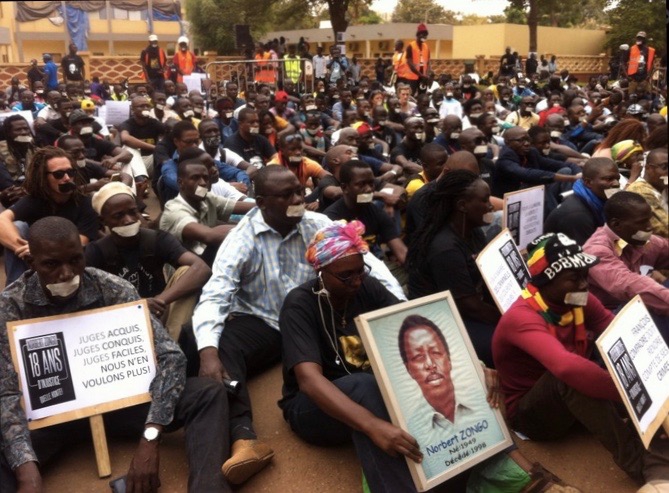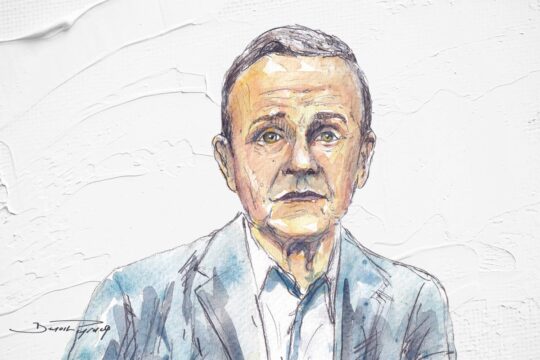December 13 marks 18 years since the assassination of journalist Norbert Zongo in Burkina Faso. Civil society organizations are organizing commemorations. But the Zongo family is not alone in demanding justice. Those close to former president Thomas Sankara, killed 29 years ago, are also waiting for justice, but without much hope, since the leading suspect, ex-president Blaise Compaoré, still has long reach even if he was chased from power two years ago by a popular uprising.
Hopes of justice in the two cases were kindled after the uprising at the end of October 2014 that ousted Blaise Compaoré, who had been in power for 27 years. Popular anger was stirred when he tried to change the Constitution to secure himself yet another term in office. After he was chased out, a one-year transition led to presidential and legislative elections which were hailed as free and fair. But ensuring the success of the polls has for a while taken precedence over the thirst for justice, which was one of the things that sparked the 2014 uprising. Two years on, the victims are becoming impatient.
Renowned investigative journalist Norbert Zongo and the three people travelling with him were killed on December 13, 1998. Their bodies were found in their burned out car, 100 km from Ouagadougou. Judicial authorities have not yet provided a motive for the attack, but it is popular knowledge that Zongo was investigating the death under torture of David Ouedraogo, driver of President Blaise Compaoré’s brother François. The journalist’s murder provoked a strong outcry in Burkina Faso and beyond. Given the scale of the protests, an independent commission of inquiry was set up. It pointed to “six serious suspects”, all members of the presidential guard. But only one was indicted, before the case was dismissed.
Zongo inquiry relaunched
It was not until people close to Zongo and the Burkina Faso Movement for Human and People’s Rights (MBDHP) went to the African Court of Human and People’s Rights (ACHPR) that the case was reopened. In July 2015, the ACHPR ordered the State of Burkina Faso to pay 356,000 Euros to the victims’ relatives. This decision “has been fully executed by the State,” says Bénéwendé Sankara, a lawyer who heads the Sankarist party (which has joined the new government majority). It nevertheless took five months, more than the deadline set by the ACHPR, and an open letter to the Prime Minister for the money to be disbursed.
Above all, the ACHPR ordered that investigations into these murders be reopened. The investigations have not been easy. Burkina Faso’s judicial authorities announced a year ago, just before the 17th anniversary of Norbert Zongo’s death, that three former soldiers of the Presidential Security Regiment (RSP) were being put under investigation. Their names are not new to the case, since they are among the “six serious suspects” named by the independent commission of inquiry. But the victims’ friends and relatives and their lawyers, who believe François Compaoré was behind the murders, say they are small fry.
A year of silence
And for the last year silence has again fallen on this case. François Compaoré, who has fled, has not been troubled. It is not known how the investigations are progressing. Judge Moriba Traoré, secretary general of the country’s union of magistrates (SBM), says there is a communication problem. “We have not yet managed to put a communication mechanism in place,” he says. “So even if there has been some progress, people think nothing has moved. We cannot make everything public, but we are looking at how we can communicate so everyone has a minimum of information.”
Lawyer Benéwendé Sankara invites people to be patient so as to avoid “judicial errors and cheap justice”. He says he is not worried “because there is no longer a political block as we had under the regime of Blaise Compaoré”. Abdoulaye Diallo, who heads the Norbert Zongo press centre, does not agree. “I am fed up with things not moving forward”, he complains. “We do not understand why they are stagnating.” He says he is “angry” and “outraged” and that there is at least a “lack of political will” to move this case forward. For the last year, “things have not progressed at all, so far as we know, and that is intolerable”, says Chrysogone Zougmoré, president of the MBDHP. “It is now two years since Blaise Compaoré left. We cannot understand the government’s attitude. If it had expressed strong will, the case would have moved forward. It is disgusting.”
Sankara case and obstacles abroad
The case of Captain Thomas Sankara, an icon of Burkina Faso, was also reopened after the popular uprising. The former president and twelve of his companions were killed on October 15, 1987, in the coup d'Etat that brought Blaise Compaoré to power.
Who gave the order to kill the military captain and President? No-one can say for certain, but grave suspicions hang over Compaoré. Prosper Farama, the Sankara family lawyer, says that since Compaoré’s fall “we should recognize that there has been much progress, given that there have been indictments (14) and expert reports. Some 100 witnesses are also said to have been heard”.
Obstacles remain, however. Nineteen months after the alleged remains of Thomas Sankara and his companions were exhumed, there is still no confirmation on whether the bodies are theirs. Expert examinations in Marseille, France, did not identify any DNA. A second expert investigation was commissioned in Spain in July 2016, but has not yet issued its conclusions.
That is not all. It became known in October that military judicial authorities, who are in charge of the case, have requested the lifting of defence secrecy in France. Many supporters of Thomas Sankara think that France, whose interests Sankara was upsetting, hatched or took part in the coup d'Etat during which he was killed. The Sankara family lawyers are not very optimistic. “We are not very hopeful,” says Guy Hervé-Kam, case lawyer for Balai Citoyen, a civil society organization that played a key role in Compaoré’s ouster. “But at some point there will perhaps be people in France who remember that France is also the country of human rights.” The biggest obstacle is perhaps in Côte d'Ivoire. Suspect Number 1, Blaise Compaoré, has taken refuge there and is close to the Ivorian president Alassane Ouattara. Compaoré is charged with “murder, hiding corpses and threatening State security”. Burkina Faso has issued an international arrest warrant and officially requested cooperation from Côte d'Ivoire, but so far in vain. “Whatever the decision handed down, if Blaise Compaoré’s version of events is not heard, the case will be incomplete,” says lawyer
Farama, who thinks Compaoré’s failure to appear points to him having ordered the assassination. “For me it is clear, especially if he does not deign to come and offer an explanation to the judges.”
How far will the government’s goodwill go?
It remains to be seen how far the new authorities will push the case, given that some of them have links with the Compaoré regime. The NGO International Crisis Group (ICG) warned in a report in early 2016 that “impunity and injustice, if they persist, could quickly push the people of Burkina Faso to take to the streets again”. But, it adds, “since the new authorities sprang from the old regime, some judicial cases that could compromise the new government may never reach a conclusion”.
“How can we not suspect them today of doing everything to stall this case?” asks lawyer Farama. “They need to demonstrate that such suspicions are unfounded. But up to now, I do not think they have done that.”





